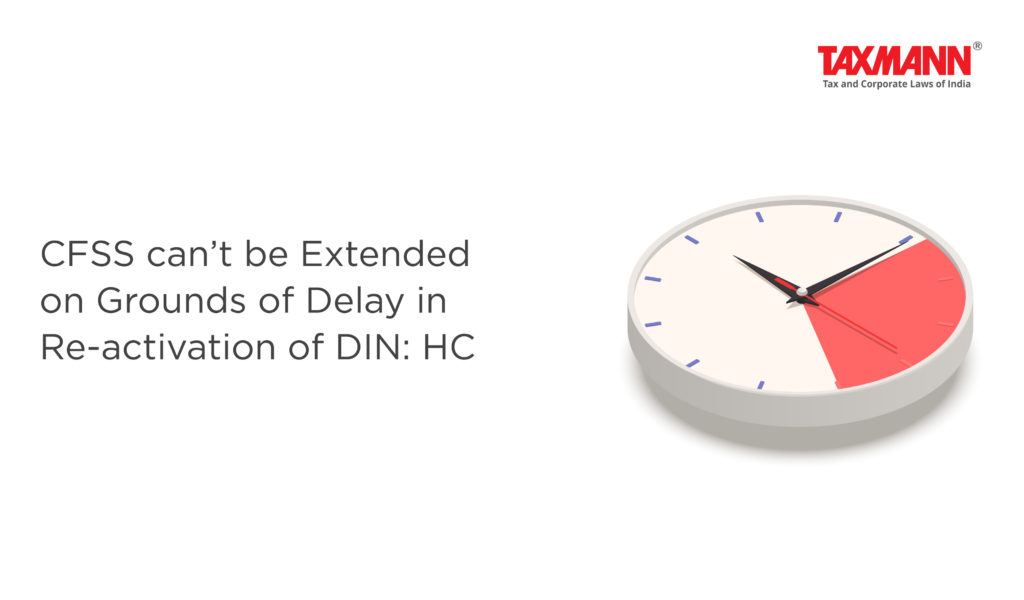CFSS can’t be Extended on Grounds of Delay in Re-activation of DIN: HC
- Blog|News|Company Law|
- 2 Min Read
- By Taxmann
- |
- Last Updated on 26 May, 2023

Case Details: Spread Infotech Consultants (P.) Ltd. v. Ministry of Corporate Affairs - [2023] 150 taxmann.com 155 (HC-Delhi)
Judiciary and Counsel Details
-
- Prathiba M. Singh, J.
- Vansh Gandotra, Adv. & Ravinder Singh Chauhan for the Petitioner.
- Ajay Digpaul, CGSC, Kamal R. Digpaul & Ms Swati Kwatra, Advs. for the Respondent.
Facts of the Case
In the instant case, the petitioner company’s name was struck off from the Register of Companies due to non-filing of requisite documents and consequently, the DIN/DIRs of both its directors were suspended.
In the meantime, in light of the COVID-19 pandemic, the Ministry of Corporate Affairs introduced the Companies Fresh Start Scheme (CFSS), 2020 to allow a fresh start for defaulting companies and directors of such companies. Meanwhile, the petitioner company was restored.
Subsequently, the petitioner filed a petition requesting the reactivation of its directors’ DIN. However, one director’s DIN was restored after the last date of the CFSS Scheme viz, on 31-12-2020. Consequently, the filing of the balance sheet could not be done as the DIN of both directors was required.
In response, the petitioner filed an instant writ petition praying that the benefit of the CFSS scheme ought to be allowed and delay in filing ought to be condoned. The petitioner had been a consistent defaulter in filing documents and forms for several years.
Thus, CFSS could not be extended beyond the date of operation inasmuch as there were a large number of companies, which were disqualified and if benefit under CFSS was extended to such companies beyond the date, the said scheme would be completely unworkable.
High Court Held
The High Court observed that the petitioner was conscious of the deadlines under the CFSS and ought to have taken its remedies, but had chosen not to do so. Consequently, the Court determined that extending the benefits of the CFSS scheme to the petitioner would not be appropriate.
The High Court held that since the DIN was restored only after the order was passed by the Court, the petitioner would be permitted to submit the necessary documents and forms along with the requisite fee, in accordance with the Companies Act and Rules. However, there would be no prosecution for the delay in filing the documents.
List of Cases Referred to
-
- Ravinder Singh Chauhan v. Ministry of Corporate Affairs [W.P. (C) 6886 of 2020, dated 24-9-2020] (para 8).
Disclaimer: The content/information published on the website is only for general information of the user and shall not be construed as legal advice. While the Taxmann has exercised reasonable efforts to ensure the veracity of information/content published, Taxmann shall be under no liability in any manner whatsoever for incorrect information, if any.

Taxmann Publications has a dedicated in-house Research & Editorial Team. This team consists of a team of Chartered Accountants, Company Secretaries, and Lawyers. This team works under the guidance and supervision of editor-in-chief Mr Rakesh Bhargava.
The Research and Editorial Team is responsible for developing reliable and accurate content for the readers. The team follows the six-sigma approach to achieve the benchmark of zero error in its publications and research platforms. The team ensures that the following publication guidelines are thoroughly followed while developing the content:
- The statutory material is obtained only from the authorized and reliable sources
- All the latest developments in the judicial and legislative fields are covered
- Prepare the analytical write-ups on current, controversial, and important issues to help the readers to understand the concept and its implications
- Every content published by Taxmann is complete, accurate and lucid
- All evidence-based statements are supported with proper reference to Section, Circular No., Notification No. or citations
- The golden rules of grammar, style and consistency are thoroughly followed
- Font and size that’s easy to read and remain consistent across all imprint and digital publications are applied



 CA | CS | CMA
CA | CS | CMA
